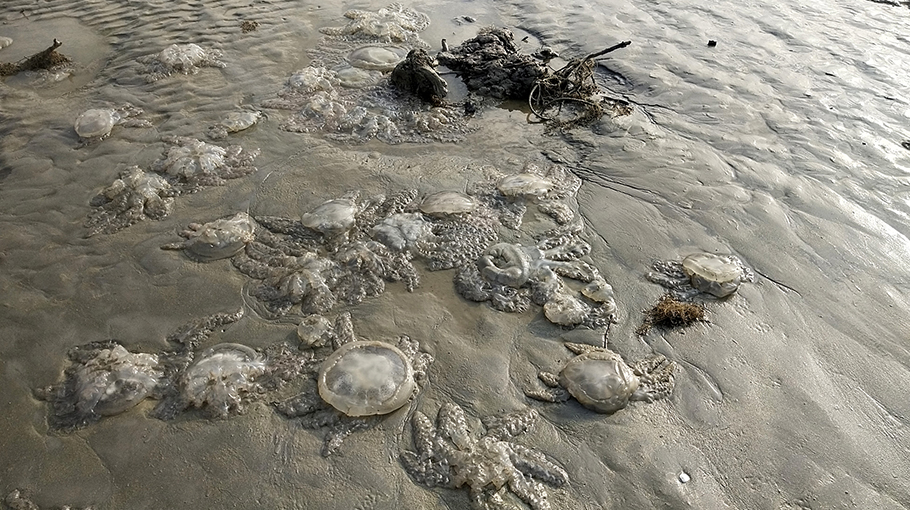Dead jellyfish rotting on Kuakata beach

Jellyfish are a type of invertebrate found in all seas of the world. Recently jellyfish have flooded the 16-kilometer beach of Kuakata in the Bay of Bengal. There are piles of dead jellyfish on the beach from Andharamanik estuary to Ramnabad channel. The rotten stench of these jellyfish is spreading in the air. The environment is facing disaster. However, no one is taking initiative to remove them. The incoming tourists have demanded to remove these and cover the sand.
At low tide they come across the beach and at low tide they fall all over the beach.
Coastal fishermen say numerous jellyfish have been floating in the Bay of Bengal for the past month. They are wearing extreme despair. They cannot cast nets in the sea because of jellyfish. Thousands of vertebrates are dying in the net. Fishermen's nets are breaking. So the fishermen have been forced to make nets. They have been unemployed for the last 15 days. As a result, hundreds of coastal fishermen are facing financial losses. Fishermen have claimed that they could have become economically self-sufficient if the dead jellyfish had been put to good use.
Thousands of jellyfish are scattered from Lemburchar in the Andharamanik estuary of Kuakata Beach to the Ramnabad Channel to the east. In addition, 40 km east-south from Zero Point on Kuakata Beach is covered with jellyfish in the sands of Charbijay. The dead jellyfish caught in the fishermen's nets are floating on the shore and lying on the beach. These have given birth to a kind of rotting insect. The environment is being ruined by rotten stench. Unemployed fish workers are weaving nets. Some people are washing the nets and drying them in the sun. Pole net fishing trawlers are kept safe on the beach.
"Jellyfish have been floating in the ocean for the last one month," said Harris, a fisherman in Kawarchar. However, the number is increasing day by day. On Saturday, a large number of jellyfish have floated in the tide.
Harun Pada, a fisherman from Char Gangamati area, said jellyfish come every year. But this year the amount is much higher. Excessive entanglement causes the net to rupture. All the nets are brought to shore. Unemployed now. So I'm repairing the torn mesh.
Saiful Islam, a tourist visiting Gangamati area, said, "Jellyfish should be removed quickly and covered with sand." Otherwise, the environment will face disaster. The stench is spreading in the air right now. '
Sagarika Smriti, an assistant researcher at the Ecofish-2 project in Patuakhali district, said the jellyfish were washed away by the tide and stuck in the beach sand. Since they are not proficient in swimming, they cannot go downhill. However, looking at the sudden amount of jellyfish, it seems that the health of the sea is not good. It may also be that the fish that eat jellyfish has decreased. As a result, the excess has increased.
Apu Saha, senior fisheries officer of Kalapara Upazila, said that these vertebrate animals could not move in the opposite direction. However, he could not confirm the reason for the floating jellyfish.
In this regard, Kalapara Upazila Executive Officer and Member Secretary of Kuakata Beach Management Committee Abul Hasnat Shahidul Haque said that it is not possible to remove the jellyfish floating on Kuakata beach due to manpower crisis. These are not causing much damage to the decaying environment. Because jellyfish have 95% water in their body. So it dissolves in water in a day or two.




